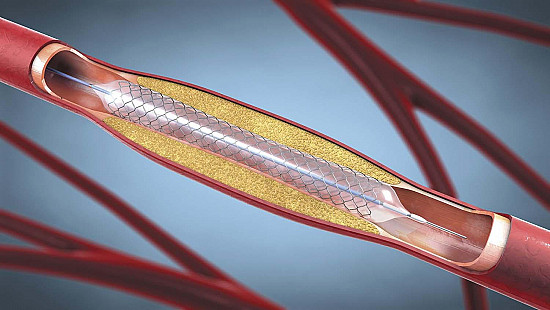Blood thinners after a stent: How long?
Ask the doctor

Q. I had three drug-coated stents implanted five years ago following a heart attack and have been taking low-dose aspirin and prasugrel (Effient) ever since. My doctor has suggested that I could stop taking the Effient. Is there any benefit to remaining on it?
A. When people receive stents (the tiny metal mesh tubes that help open narrowed arteries), doctors routinely prescribe aspirin along with another medication that prevents clots. These drugs include clopidogrel (Plavix), prasugrel (Effient), and ticagrelor (Brilinta). Like aspirin, they prevent blood components called platelets from sticking together and forming clots. Clots that form inside the stent — known as stent thrombosis — can lead to a heart attack.
The combination of aspirin and one of those stronger antiplatelet drugs is known as dual antiplatelet therapy (DAPT). The question of how long people should stay on DAPT has been a matter of debate for years. Current guidelines suggest at least one year in people who needed an emergency stent placement and at least six months after a nonemergency stent procedure. But doctors may adjust this timeline based on an individual's specific situation. For example, people who receive a stent after a heart attack or acute coronary syndrome (a sudden loss of blood flow to the heart) may benefit from staying on the drugs for an additional period beyond the first year, potentially indefinitely.
But that assumes they don't develop any major bleeding complications, the main side effect of DAPT. Major bleeding includes heavy bleeding in the stool or urine. People who develop major bleeding may need to stop taking the drugs sooner. Ideally, they should stay on DAPT for at least a month if at all possible. Rarely, bleeding can occur in the brain, which can be a disabling or fatal complication. Nuisance bleeding such as frequent gum bleeding or nosebleeds can also occur; this might also warrant shortening the duration of DAPT.
Another option your doctor may recommend is to stop taking the aspirin and continue taking only the other antiplatelet drug. Taking a proton-pump inhibitor such as omeprazole (Prilosec), which is available over the counter, or prescription-only pantoprazole (Protonix) may help reduce the risk of gastrointestinal bleeding in people taking DAPT, but check with your doctor first.
The decision to stay on DAPT should be reassessed by the doctor periodically as people grow older. With age, people often develop other conditions that raise their risk of bleeding, heart attack, or both.
Image: © PhonlamaiPhoto/Getty Images
About the Author

Deepak L. Bhatt, M.D., M.P.H, Former Editor in Chief, Harvard Heart Letter
Disclaimer:
As a service to our readers, Harvard Health Publishing provides access to our library of archived content. Please note the date of last review or update on all articles.
No content on this site, regardless of date, should ever be used as a substitute for direct medical advice from your doctor or other qualified clinician.















